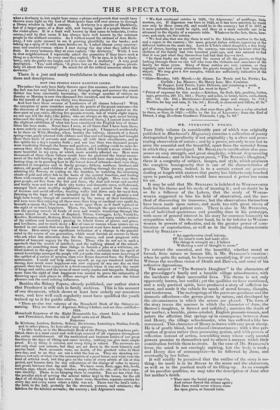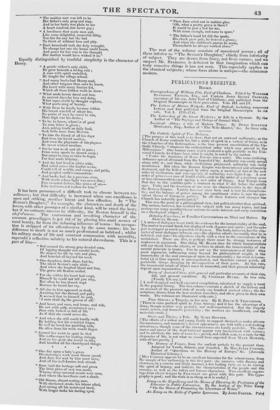MR. STERLING ' S POEMS.
Tins little volume (a considerable part of which was originally published in Blackwood's Magazine) contains a collection of poetry distinguished by peculiarity if not originality ; by a close and pene- trating observation of nature ; and by a power, not only to see but to seize the essential and the beautiful, apart from the material forms in which they are enveloped. Mr. STERLING'S versification also pos- sesses an easy strength, and great simplicity, without degenerating into weakness; and in hia longest poem, " The Sexton's Daughter," there is a congruity of subject, images, and style, which produces the complete homogeneity that is one of the characteristics of genius. This poem, indeed, is to a certain extent sal gencris; dealing at length with matters that poetry has hitherto only touched upon in passing, and which would have seemed d priori too mean for art.
It may be said that Mr. STERLING is indebted to Wounswoant both for his theme and his mode of treating it ; and no doubt he is so far a follower of the Lakers, that the study of WORDS.. WORTH suggested to him his field of observation, and the me- thod of discovering its treasures ; but the observations themselves have been made upon nature, and made too with great nicety of discrimination and patient care. There is also in Mr. STeithexo, less of individual quaintness and puerility than in his prototype, with more of general interest in his story for common humanity to sympathize with. On the other hand, he is far inferior to Wouns- woiern in powers of reflection, and in the greater power of com- bination or reproduction, as well as in the leading characteristic noted by SHELLEY- " An apprehension cleatv; intense,
Of his niind's work bad made alive The things it wrought on ; I believe Wakening a sort of thought in sense."
To extract the essential, and the beautiful, whether moral or formal, front nature or human life, is Mr. STERLING'S vocation : when he quits the actual, he becomes unsatisfying, if not mystical. Witness the needless vision of Death and Heaven, and some of his reflective digressions. The subject of "The Sexton's Daughter" is the characters of the gravedigger's family and a humble village schoolmaster, with the incidents of their uneventful lives. The theme is not only apparently barren, but sordid ; yet the qualities we have mentioned, and a truly poetical spirit, have produced a story of sufficient in- terest, and made it the vehicle for much of moral beauty, thought, and tenderness. The mainsprings of the poem are goodness and the domestic affections—the germs given by nature, and developed by the circumstances in which the actors are placed. The limn of the story traces the manner in which the character of Jane, the Sexton's daughter, is formed and unfolded ; narrates the death of her mother, a humble, pious-minded, English peasant-woman, and paints the affection that springs up in consequence between Jane and Henry, the village schoolmaster, who has suflbred a like be- reavement. This character of Henry is drawn with very great nicety.
lie is of gentle blood, but reduced circumstances; with a flume per- ception of genius rather than possessing genius, and with powers of reflection instead of action, resembling many whose early mental
powers promise to themselves and to others a success which their constitution forbids them to attain. In the case of Mr. STERLING'S
lover, the mind is not eravingly aspiring, but the body is weak ; and Henry dies of consumption—to be followed by Jane, and eventually by her father. It will readily be perceived that the outline of the story is no- thing : its merit is in its fitness to the scene and the characters, as well as in the poetical truth of its tilling-up. As an example of its peculiar qualities, we may take the description of Jane after her mother's death.
'Then soon the burial pang was o'er, And calmer flowed the stream again ;
But Jane would never witness more
An open grave, or funeral train.
"The maiden now was left to be Her father's only prop and stay, And in her looks was plain to see A heart resolved, but never gay; " A loveliness that made men sad, Like sonic delightful, mournful ditty, Too fair for any but the had To think of without love and pity.
" Each household task she duly wrought, No change but one the house could know, And peace for her was in the thought
Iler mother would have wished it so."
Equally distinguished by truthful simplicity is the character of Henry.
A gentle widow's only child, He grew beneath a loving rule ; A man with spirit undehled, He taught the village school.
"And many books had Henry read, And other tongues than ours he knew, His heart with ninny fancies fed, Which oft from hidden wells lie drew: " What souls heroic dared and bore In ancient days for love and duty, What sages could by thought explore, What poets sang of beauty.
With these he dwelt, because within His breast was full of silent fire.
No praise of men Ile eared to will, Mole high was his desire ; " To be, to know, whate'er of good. To man below is given ; Aml, asking truth as daily food, Seek little more from heaven.
" To him the friend of all his days Had been his fervid mother,
And even the playmate of his plays—
He never wished another.
" For be was mak and oft in pain ; From noisy sports he shrank away; But songs to sing or tales to feign, For him made holyday.
" And she bad lived in cities wide, Had sailed across the fearful ocean, Could tell of wealth, and camps, and pride, And peopled earth's commotion: " And books hind she a precious store, With words whose light was never dim ;
Five crowded shelves, like mines of ore—
Like undiscovered realms for hint."
It has been pronounced a difficult task to choose between ex- cellences; but that difficulty is increased when one excellence is open and striking, another latent and less effective. In "The Sexton's Daughter," Om example, the characters and death of the lovers, with other passages of a similar kind, will be rated the best; but if we estimate success by difficulty, the Sexton himself is the cluf-d'aqtrre. The coarseness and revolting character of the common gravedigger, is got rid of by placing him amid scenes of rural beauty, far from the debasing influence of towns : his occupa- tion is stripped of its offensiveness by the same means: his in- difference to death is not so much professional as habitual ; whilst his solitary mode of life and constant communion with mortality, superadd a reflective sobriety to his natural shrewdness. This is a part of him-
" Sail seemed the strong gray-beaded man, Of lagging thought and careful heed; Ile shaped his life by rule and plan, And hoarded all beyond his need.
" One daughter, little Jane, had he, The silent Sexton's only child ; And when she laughed aloud and free, The grave old Sexton smiled.
" For she within ids heart had crept, Himself he could not tell you why, But often lie has almost wept Because he heard her cry.
" All else to him appeared as dead, Awaiting but the shroud and pall; It seemed that to himself he said, ' I soon shall dig the graves of all.'
" Anti beast, and man, and home, and wife, He saw with cold, accustomed eye; Jane only looked so full of life As if that she could never die.
" And when she still could hardly walk By bolding limit his wrinkled linger, So well he loved her prattling talk, Ile often from his work would linger.
"Around her waist in sport he tied Tlw coffin-ropes fiw leading-strh!gs, Amid On his spade she learnt 10 ride, And handled all his churchyard things.
" One day upon a baby's grave
Uis morning's work must Simon spend, And Jane her scat by him must have, And all his well-known task attend.
" Soon 'mid the berbag,e soft and green The little place of rest was made, Whence daisy-covered meads were seen, And where the hawthorn east a shade.
"Old Simon, almost resting now. With slackened stroke his labour plied, And raising oft his moistened brow, With longer looks his darling eyed.
"Then Jane cried out in sudden glee, 'Oh, what a pretty grave is there! It would be just a bed for me, With room enough, and none to spare.'
"The father's hand let fall the spade, His cheek grew pale, he heaved a groan ; And when the children's graves he made, Thenceforth he always worked alone."
The rest of the volume consists of occasional poems ; all or them inferior to " The Sexton's Daughter," chiefly from inferiority of subject. They are drawn from fancy, not front nature; and we suspect Mr. STERLING is deficient in that imagination which can truly conceive things it has not seen. This especially applies to the classical subjects ; whose form alone is antique—the substance modern.



























 Previous page
Previous page